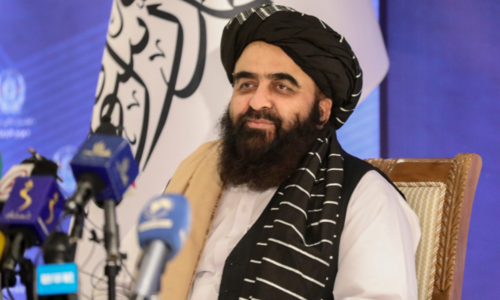LAHORE: The more Pakistan favours the Afghan Taliban, the more strengthened the banned Tehreek-i-Taliban Pakistan (TTP), the Tehreek-i-Labbaik Pakistan (TLP) and other such groups become. And Pakistan’s support to the Kabul regime does not help the Afghan people in any way.
Speakers stated this without mincing words at a session, titled “Chaos in Afghanistan and Talking to Banned Organisations”, at the Asma Jahangir Conference on Saturday.
The context of the ongoing talks between Islamabad and the TTP and a deal recently reached with the TLP attracted an enthusiastic crowd to the session. The audience was interested to learn about the experience of Afghans during their talks with the Taliban in Doha.
Moderator Ahmed Rashid opened the discussion with news that Pakistan had refused visas to some Afghans who had been invited to the conference as participants and panellists. The panel included Nader Nadery (member of the Islamic Republic of Afghanistan’s peace negotiation team); Abdullah Khenjani, Afghanistan’s former deputy minister; and Lotfullah Najafizada (director of Afghanistan’s Tolo News). They were able to participate in the conference because they had obtained visas prior to the fall of Kabul in August.
Speaker says Afghanistan is the only country without a law, and a proper system of governance
Former senator Afrasiab Khattak, MNA Mohsin Dawar and Samina Ahmed (project director for South Asia and senior Asia adviser at the International Crisis Group) were also on the panel.
Mr Najafizada blamed a “collective failure” for what happened recently in Afghanistan. In a very calculated tone, he said the Taliban and the world needed to talk about the future, instead of the failure of previous governments.
He said the Taliban needed to understand that they were ruling an Afghanistan that’s different from that of 2001. As Afghans are now more connected, the Taliban should show maturity and learn to agree to disagree and that hatred for the US could not put food on the table.
He was optimistic about the Afghans’ abilities and said the country could go in any direction in the post-America era.
Mr Nadery recalled flaws in the Doha peace talks and came up with four factors for the ongoing chaos in Afghanistan: the US policy to get out of the country was flawed; talks were simply a PR exercise where the Taliban had no intention of reaching any settlement; the Ghani government’s failure to build institutions; and Pakistan’s emphasis on defeating Indian policies in the neighbouring country rather than in serving the interests of Afghans.
The Afghan regime should adopt a political system to be able to become a part of the “mainstream world” and Pakistan must push the Kabul authorities to do so.
Mr Khenjani said the Taliban were trying to hold the Afghans hostage in order to pressure the world to grant them acceptance. Instead, he said, they should realise they were the rulers of Afghanistan and should focus on delivery.
Mr Khattak said the Taliban knew how to reward their commanders but not how to work for the people. He said Afghanistan was the only country without a law, and a proper government system, and the only country to be called a fenced prison after Pakistan installed barbed wires on its western borders.
He said that issues in Afghan policy were being decided by someone other than the prime minister. Pakistan needed to stop supporting the Afghan Taliban if it wanted to defeat the TTP.
He was of the opinion that Afghan Taliban and the TTP were two sides of the same coin. Similarly, the TLP and TTP had the common agenda of “political Islam”, which made them allies.
MNA Dawar condemned the refusal to grant visas to Afghan invitees, and said Pakistan was open to people like [acting Afghan Foreign Minister Amir] Muttaqi, but not to the real Afghans. He said all those who played a role in the collapse of the previous Afghan government would soon regret their decision.
Published in Dawn, November 21st, 2021
















































